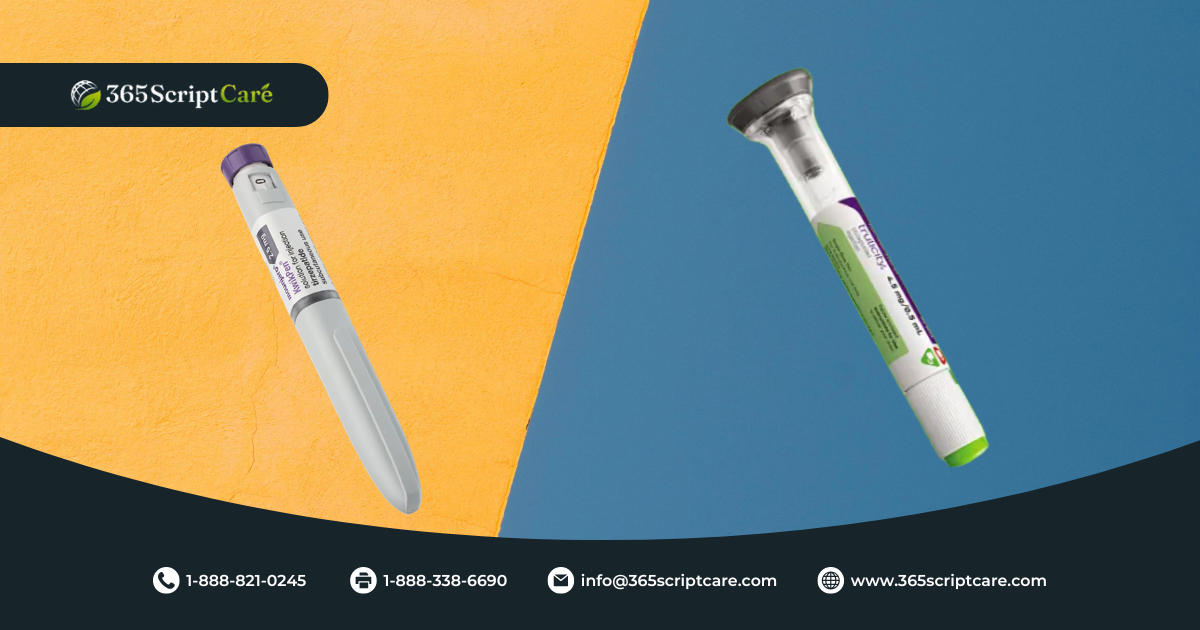Maintaining blood sugar control when living with diabetes necessitates a detailed plan. In the treatment of diabetes, a novel drug called Rybelsus has gained popularity. The long-term negative effects of Rybelsus are explored in this article, providing readers with a comprehensive viewpoint for those considering or already taking this medication.
Making educated choices concerning the management of diabetes requires a thorough understanding of the possible effects. Understanding the long-term impacts of Rybelsus can help you take a proactive and knowledgeable approach to your health journey, regardless of how long you’ve been using it.
What is Rybelsus
Rybelsus is a medication used for the treatment of type 2 diabetes. It belongs to the class of drugs known as glucagon-like peptide-1 receptor agonists (GLP-1 RAs). Unlike many other medications in this class that require injection, Rybelsus stands out as an oral tablet. Its active ingredient, semaglutide, mimics the effects of the natural hormone GLP-1. This hormone plays a crucial role in regulating blood sugar levels by stimulating insulin release, reducing glucose production by the liver, and slowing down stomach emptying, which helps manage appetite.
The mechanism of action of Rybelsus involves the activation of GLP-1 receptors, leading to improved blood sugar control after meals. By enhancing insulin secretion and inhibiting glucagon release, Rybelsus helps lower blood glucose levels.
Additionally, its unique oral form provides a convenient alternative for individuals who prefer not to use injectable medications for diabetes management. The medication has shown efficacy in both glycemic control and, in some cases, weight loss, making it a valuable option for individuals with type 2 diabetes seeking comprehensive management.
Rybelsus Long-Term Side Effects
Although Rybelsus, also known as semaglutide, is a promising drug for the treatment of type 2 diabetes, it is important to comprehend its long-term negative effects in order to ensure safe and successful use. Even though there is ample evidence of certain negative impacts, further research is still being done to fully understand the range of long-term consequences. Here, we look at possible long-term Rybelsus side effects, highlighting the significance of keeping an eye on things and being in touch with medical professionals.
Intestinal Side Effects
- Long-Term Symptoms: Rybelsus frequently causes gastrointestinal side effects, including nausea, diarrhea, and abdominal pain, which some people may experience for a long time. Adherence to treatment and daily living may be impacted by these symptoms. In order to discuss potential therapeutic options, patients who have severe or ongoing gastrointestinal distress should report these symptoms to their healthcare physician.
- Strategies for Management: These symptoms may be lessened by modifying the medication’s dosage or schedule, making dietary adjustments, or applying complementary therapies.
Increased Risk
- Pancreatitis: While uncommon, pancreatitis is a dangerous ailment that can be linked to long-term Rybelsus use. Severe abdominal discomfort, nausea, vomiting, and fever are signs of pancreatitis. If these symptoms appear, you must get medical help right away.
- Monitoring: Patients having a history of pancreatitis or those taking other drugs that may alter pancreatic function should have regular monitoring for signs of pancreatitis and other related problems.
Dangerous Hypoglycemia
The long-term use of Rybelsus carries a risk of hypoglycemia (low blood sugar), particularly when used with other drugs that lower blood sugar. Hypoglycemia can cause lightheadedness, perspiration, disorientation, and fainting.
Continuous Surveillance
To avoid hypoglycemia and guarantee balanced glucose control, patients should routinely check their blood glucose levels and collaborate with their healthcare practitioner to modify medication regimens as necessary.
Differences in Weight
- Impacts on Weight: As an agonist of the GLP-1 receptor, rybelsus can affect weight and hunger. Even though it’s meant to help with weight management, some people may notice fluctuations in their weight over time.
- End-of-Term Effect: To reach and maintain desirable weight results, weight monitoring and dietary and lifestyle adjustments may be required.
Cardiovascular Impacts
- Favorable Results: With Rybelsus, long-term cardiovascular outcomes are usually good. Potential cardiovascular benefits, such as a decreased risk of significant adverse cardiovascular events, have been suggested by clinical research.
- Continuous Surveillance: Notwithstanding these encouraging results, patients who already have cardiovascular diseases should routinely check on their cardiovascular health and talk to their doctor about any concerns.
Interaction with Medical Professionals
- Need for Frequent Check-Ups: Keeping in regular contact with medical professionals is essential for treating Rybelsus side effects over the long run. Healthcare professionals are able to evaluate a patient’s state of health, handle any new issues that may arise, and modify the treatment plan as needed.
- Personalized Management: Tailored treatment regimens that take into account the patient’s general health, reaction to the drug, and any possible side effects can help maximize benefits and reduce risks.
When using Rybelsus for an extended period of time, potential adverse effects such as pancreatitis, hypoglycemia, thyroid tumors, weight fluctuations, and cardiovascular impacts must be closely monitored. To guarantee the safe and efficient use of this drug in the management of type 2 diabetes, proactive management techniques and routine follow-ups with healthcare practitioners are crucial. Patients can better manage their treatment and general health by keeping lines of communication open with medical experts and following suggested monitoring protocols.
Interactions with Other Medications
Navigating the interactions between Rybelsus and other medications is paramount for individuals seeking effective diabetes management. Rybelsus, a GLP-1 receptor agonist, may interact with various commonly prescribed drugs, potentially influencing their effectiveness or triggering unintended side effects. Individuals must communicate openly with their healthcare provider about their complete medication regimen, including over-the-counter drugs and supplements.
Rybelsus interactions can occur with medications that affect gastrointestinal motility or have a direct impact on blood sugar levels. Common drugs such as certain antibiotics, steroids, or antidiabetic agents may necessitate dosage adjustments or careful monitoring when used alongside Rybelsus. Medications affecting thyroid function or liver enzymes may also require special attention when combined with Rybelsus.
Handling Rybelsus Side Effects

For those using Rybelsus, effectively controlling side effects is crucial to maintaining optimum health and making sure the medication’s advantages are maximized. This entails keeping in close contact with medical professionals, keeping an eye out for particular adverse effects, and putting preventative measures in place in case something goes wrong. Here, we go into further detail about how to handle both common and uncommon Rybelsus side effects.
Intestinal Problems
- Regular Adverse Reactions: With Rybelsus, reports of gastrointestinal adverse effects, including nausea, diarrhea, and abdominal discomfort, are common. These side effects may affect everyday functioning and treatment compliance.
Strategies for Management
- Modifications to Timing: In contrast to taking Rybelsus on an empty stomach, taking it with or after a meal may help reduce gastrointestinal discomfort. Regarding time, people should heed the advice of their healthcare professional.
- Dietary Modifications: Reduced gastrointestinal symptoms could be achieved by eating a bland diet and staying away from greasy and spicy meals. Starting with a smaller dose and gradually increasing it can also aid the body’s acclimation to the medication.
Bone Problems
- Potential Effect: Certain GLP-1 receptor agonists have been connected to problems with bone health, even though this is not often documented. Any possible effects on bone density should be disclosed to patients taking Rybelsus.
Strategies for Management
- Exercises Including Weight: Regular weight-bearing activities can help preserve bone strength and stop the loss of bone density. Examples of these exercises include walking and resistance training.
- Monitoring Bone Density: Patients with pre-existing bone health issues or those at increased risk of osteoporosis may benefit from routine bone density testing.
Cardiovascular Concerns
- Monitoring Requirements: Although Rybelsus generally has excellent long-term cardiovascular results, people with pre-existing cardiovascular issues should have regular monitoring.
Management Strategies
- Regular Check-Ups Regular cardiovascular exams, such as measurements of cholesterol and blood pressure, aid in the management of cardiovascular health.
- Changes to Lifestyle Overall cardiovascular health is supported by leading a heart-healthy lifestyle that includes frequent exercise and a balanced diet.
Thyroid Concerns
- Potential Risk: Research on animals indicates that semaglutide may raise the risk of thyroid cancers. This risk has not been conclusively proven in human research, although it is still a topic of interest.
Management Strategies
- Regular Monitoring: It is advised to have regular thyroid function tests, which include measuring thyroid-stimulating hormone (TSH) levels and looking for any indications of aberrant thyroid function.
- Symptom Recognition: Patients should alert their healthcare physician as soon as they notice any symptoms, such as chronic coughing, neck swelling, or unexpected changes in voice.
Health of the Liver
- Potential Impacts: Any medicine can have negative effects relating to the liver, however they are uncommon. To find any problems early, routine monitoring is crucial.
Strategies for Management
- Regular Liver Function Testing: Regular liver function testing, or LFTs, can assist in identifying any abnormal liver function or possible liver damage.
- Symptom Tracking: Patients should seek medical assistance if they experience symptoms such as chronic stomach pain, black urine, or jaundice (yellowing of the skin or eyes).
Uncommon Side Effects
Allergic reactions to Rybelsus are uncommon, however they might occur and include rash, itching, swelling, extreme dizziness, or difficulty breathing.
Management Techniques
- Emergency Medical Care: Whenever there are indications of an allergic reaction, you should get medical help right once to treat the reaction and stop it from getting worse.
- Assessment with Medical Professionals: Before beginning Rybelsus therapy, patients should discuss with their healthcare provider any history of allergies or adverse drug reactions.
Overall Advice for Handling Side Effects
- Open Communication: Talk about any side effects you experience and work with your healthcare practitioner to modify the treatment plan as necessary.
- Personalized Approach: Develop management plans with your healthcare provider based on each patient’s unique health needs and Rybelsus reaction.
- Education and Awareness: To better understand and address any potential problems, stay up to date on possible side effects and how to manage them.
To maximize the benefits of Rybelsus in the treatment of type 2 diabetes, side effect management must be done well. Patients can make the most out of their treatment by using tactics including timing medication adjustments, keeping an eye on liver and bone health, getting frequent thyroid and cardiovascular exams, and being aware of adverse responses. The long-term safety and efficacy of Rybelsus therapy depend on proactive management and open contact with healthcare practitioners.
Conclusion
It’s crucial to grasp the potential risks associated with Rybelsus before initiating its use. The recommended daily dosage is 3 mg, and it may take up to 12 weeks to observe noticeable results. Although Rybelsus is generally well-tolerated, pregnant women should seek advice from their doctor before considering it.
Typical side effects encompass nausea, dizziness, constipation, headache, and fatigue. However, if you encounter severe reactions or harbor any concerns about the medication, promptly consult your doctor.
Moreover, alternatives are available for those unable to take Rybelsus. Engaging in a discussion with your physician will help identify a suitable treatment plan. Armed with this information, you can confidently decide whether Rybelsus aligns with your individual needs. You can buy cheap Rybelsus online from Canada through 365 Script Care.



